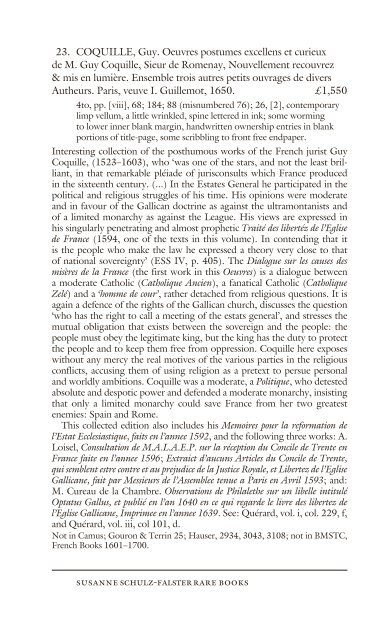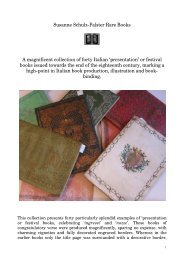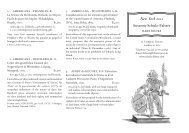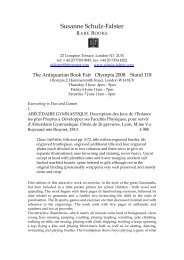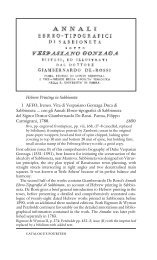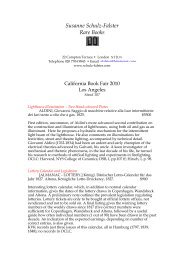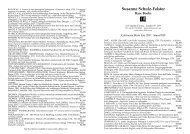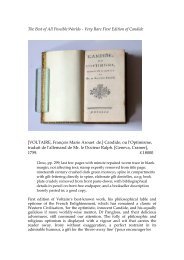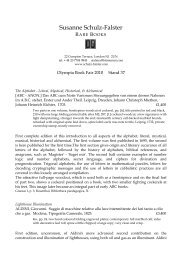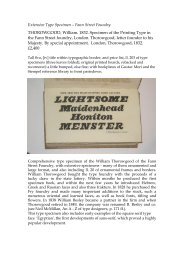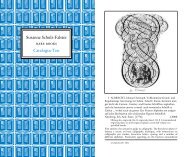Susanne Schulz-Falster Catalogue Eighteen - International League ...
Susanne Schulz-Falster Catalogue Eighteen - International League ...
Susanne Schulz-Falster Catalogue Eighteen - International League ...
Create successful ePaper yourself
Turn your PDF publications into a flip-book with our unique Google optimized e-Paper software.
23. COQUILLE, Guy. Oeuvres postumes excellens et curieux<br />
de M. Guy Coquille, Sieur de Romenay, Nouvellement recouvrez<br />
& mis en lumière. Ensemble trois autres petits ouvrages de divers<br />
Autheurs. Paris, veuve I. Guillemot, 1650. £1,550<br />
4to, pp. [viii], 68; 184; 88 (misnumbered 76); 26, [2], contemporary<br />
limp vellum, a little wrinkled, spine lettered in ink; some worming<br />
to lower inner blank margin, handwritten ownership entries in blank<br />
portions of title-page, some scribbling to front free endpaper.<br />
Interesting collection of the posthumous works of the French jurist Guy<br />
Coquille, (1523–1603), who ‘was one of the stars, and not the least brilliant,<br />
in that remarkable pléiade of jurisconsults which France produced<br />
in the sixteenth century. (...) In the Estates General he participated in the<br />
political and religious struggles of his time. His opinions were moderate<br />
and in favour of the Gallican doctrine as against the ultramontanists and<br />
of a limited monarchy as against the <strong>League</strong>. His views are expressed in<br />
his singularly penetrating and almost prophetic Traité des libertéz de l’Eglise<br />
de France (1594, one of the texts in this volume). In contending that it<br />
is the people who make the law he expressed a theory very close to that<br />
of national sovereignty’ (ESS IV, p. 405). The Dialogue sur les causes des<br />
misères de la France (the first work in this Oeuvres) is a dialogue between<br />
a moderate Catholic (Catholique Ancien), a fanatical Catholic (Catholique<br />
Zelé) and a ‘homme de cour’, rather detached from religious questions. It is<br />
again a defence of the rights of the Gallican church, discusses the question<br />
‘who has the right to call a meeting of the estats general’, and stresses the<br />
mutual obligation that exists between the sovereign and the people: the<br />
people must obey the legitimate king, but the king has the duty to protect<br />
the people and to keep them free from oppression. Coquille here exposes<br />
without any mercy the real motives of the various parties in the religious<br />
conflicts, accusing them of using religion as a pretext to persue personal<br />
and worldly ambitions. Coquille was a moderate, a Politique, who detested<br />
absolute and despotic power and defended a moderate monarchy, insisting<br />
that only a limited monarchy could save France from her two greatest<br />
enemies: Spain and Rome.<br />
This collected edition also includes his Memoires pour la reformation de<br />
l’Estat Ecclesiastique, faits en l’annee 1592, and the following three works: A.<br />
Loisel, Consultation de M.A.L.A.E.P. sur la réception du Concile de Trente en<br />
France faite en l’annee 1596; Extraict d’aucuns Articles du Concile de Trente,<br />
qui semblent estre contre et au prejudice de la Justice Royale, et Libertez de l’Eglise<br />
Gallicane, fait par Messieurs de l’Assemblee tenue a Paris en Avril 1593; and:<br />
M. Cureau de la Chambre. Observations de Philalethe sur un libelle intitulé<br />
Optatus Gallus, et publié en l’an 1640 en ce qui regarde le livre des libertez de<br />
l’Eglise Gallicane, Imprimee en l’annee 1639. See: Quérard, vol. i, col. 229, f,<br />
and Quérard, vol. iii, col 101, d.<br />
Not in Camus; Gouron & Terrin 25; Hauser, 2934, 3043, 3108; not in BMSTC,<br />
French Books 1601–1700.<br />
The Leaning Towers of Bologna<br />
susanne schulz-falster rare books catalogue eighteen<br />
24. DALL’AJA, Martino. Il comento di ser Martino dall’Aja. Nel<br />
quale spiegasi a Donna Berta dal Mulino un libretto, che venne alla<br />
luce l’anno 1792 con l’aggiunta di un dialogo fra uno stampatore, ed<br />
un poetuzzo. Dedicato alla sublime, ed eccelsa Torre degli Asinelli.<br />
Venice, Antonio Curti, 1799. £550<br />
Tall 8vo, engraved frontispiece, pp. [viii], 9–108, [1] privilege,<br />
[3] blank, including initial blank; uncut in contemporary blue stiff<br />
wrappers; early reback.<br />
First edition of a fine light-hearted essay on the beauty and size of the<br />
Two Towers of Bologna. The towers, the Asinelli and the Garisenda are<br />
both of them leaning, and are the symbol of the city. The fine engraved<br />
frontispiece shows the two towering over the clock tower of San Marco’s<br />
in Venice, the leaning tower of Pisa and the cathedral of Modena. The work<br />
was apparently first published on the occasion of a wedding in 1792 and<br />
dedicated to the mother of the bridegroom.<br />
Particularly appealing is the second half, which contains a dialogue<br />
between a bad poet and his printer. The poet complains about the difficulty<br />
of expressing his high emotions, the printer gives welcome advice.<br />
Morazzoni, p. 223; uncommon, OCLC: Harvard.


